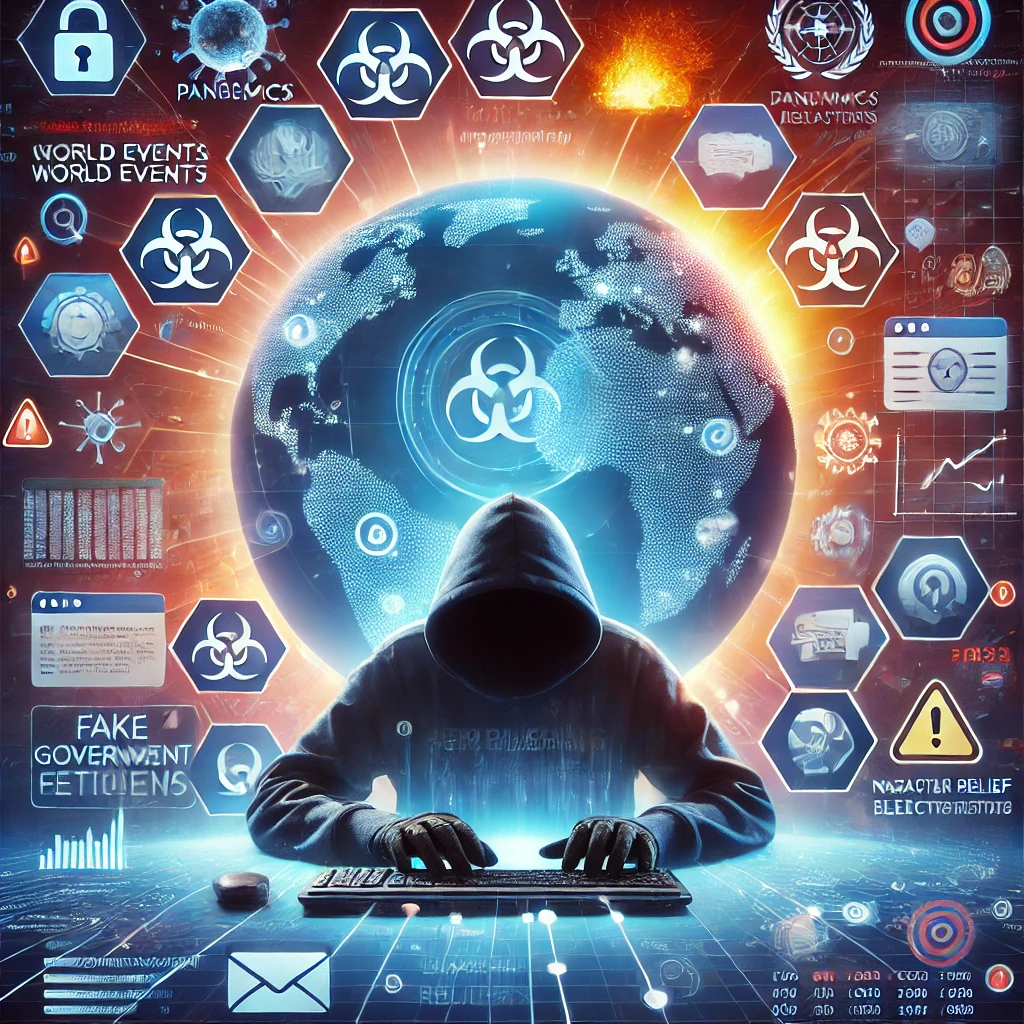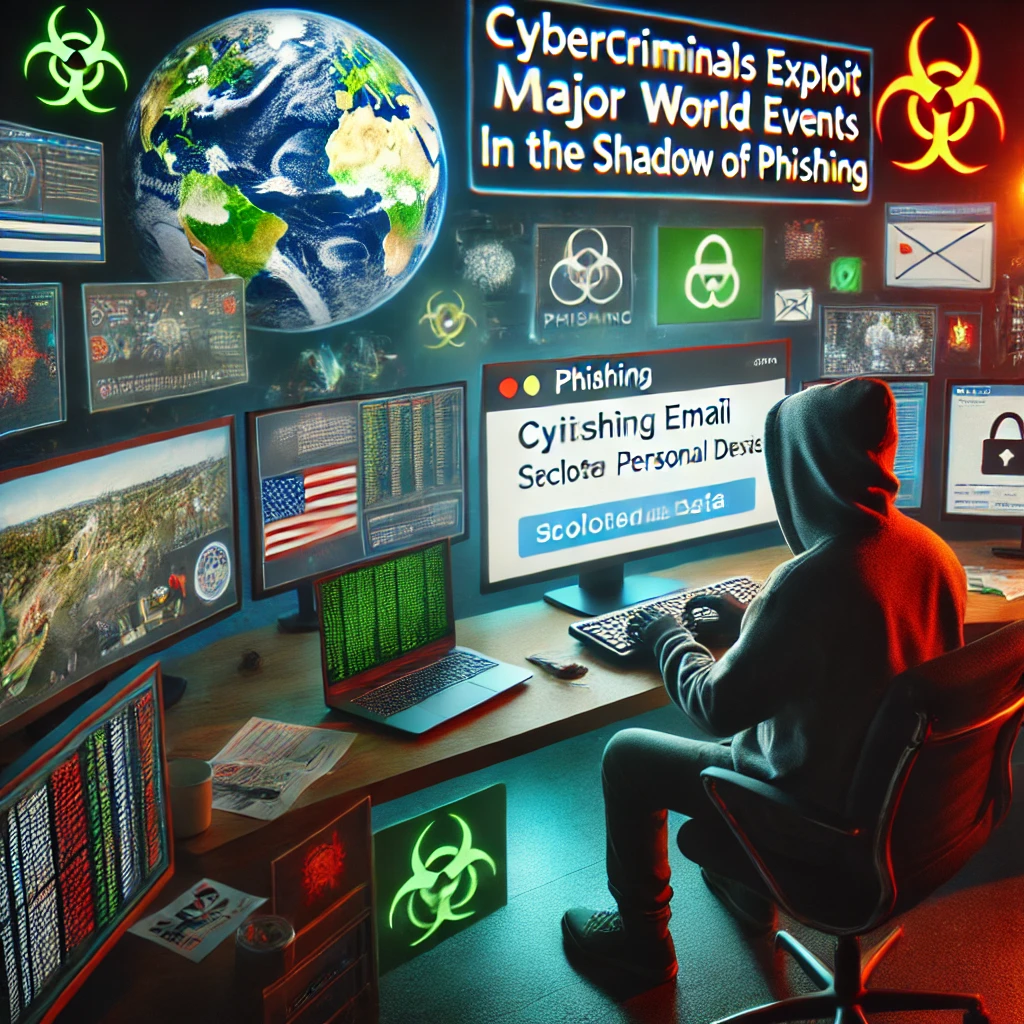Cybercriminals are becoming progressively more skilled in the age of modern technology, and they take advantage of significant global events to launch phishing attacks that play on people’s interest and trust. The cybercrime known as “phishing,” in which criminals pose as reputable companies in order to obtain private data, has changed dramatically over time. Social networking and instant messaging services have made it easier than ever for cybercriminals to target their victims. This blog discusses how cybercriminals leverage important global events to improve their phishing schemes and offers advice on how to spot and remain out of these pitfalls.
1. Exploiting Global Crises: The COVID-19 Pandemic
A great instance of how cybercriminals profit from global challenges is the COVID-19 pandemic. Phishing schemes expanded quickly around the globe in parallel with the virus’s spread. The Interpol research states that in the initial months of the pandemic, phishing and online scams increased by more than 569%. Emails encouraging recipients to click on links to learn more about the virus or download fictitious safety guidelines were sent by attackers posing as representatives of respectable institutions like the World Health Organization (WHO) or the Centers for Disease Control and Prevention (CDC). These links often lead users to fraudulent websites that may steal their data or infect their devices with malware.
A specific instance concerned emails pretending to be government stimulus funds. To “claim” their funds, recipients of these emails were required to provide their personal information and banking details. Several individuals became prey to these frauds, leading to significant monetary losses.
2. Capitalizing on Natural Disasters
Cybercriminals have an additional chance to use phishing attacks during natural catastrophes like hurricanes, earthquakes, and wildfires. People are easy targets for phishing attempts during such situations since they are frequently determined to contribute and give relief efforts. For example, following Hurricane Dorian in 2019, scammers sent emails pretending to be volunteer organizations asking for funds. These emails frequently requested sensitive information, such as credit card details, or carried links to fake websites, which can result in fraud and fraudulent transactions.
The Federal Trade Commission (FTC) conducted research that revealed a notable spike in phishing emails that claimed to be from well-known organizations such as UNICEF or the Red Cross shortly after disasters. The FTC also revealed that millions of dollars were fraudulently donated as a result of these schemes.
3. Leveraging Political Events and Elections
Phishing attacks depend on political events and elections. Cybercriminals take advantage of these incidents to induce anxiety and a sense of urgency in people, making them make quick decisions. Phishing attempts aimed at voters increased during the 2020 U.S. Presidential Election. Emails posing as voter registration forms or political campaigns were sent by scammers, who requested that recipients confirm their voter status by clicking on fictitious links or divulging personal information.
One such instance was emails claiming to provide the most recent election results, which connected to websites infected with malware. According to research conducted by cybersecurity company Proofpoint, the frequency of these scams increased by 400% during the election season, demonstrating the degree to which cybercriminals take advantage of political developments.

4. Exploiting Financial Crises and Economic Stimulus Programs
Other stimulants for phishing attacks include economic instability and government stimulus programs, which cybercriminals use to target people who are worried about their financial situation. During the economic downturn caused by the pandemic, phishing emails pose as from government agencies such as the IRS or HMRC spiked, asking recipients to download attachments or provide personal information in order to “verify” their eligibility for financial aid. Kaspersky Lab reported a 22% increase in these kinds of phishing attempts during the height of the pandemic-induced economic crisis, highlighting how cybercriminals prey on people’s vulnerabilities during uncertain financial circumstances.
5. Manipulating Entertainment and Pop Culture Events
Major entertainment events, such as the release of well-known films or sporting events, are also targeted by cybercriminals. For instance, scammers use links to “free streaming” or “exclusive content” in their phishing emails, which they send out in line with the premiere of popular movies or important sporting events like the FIFA World Cup. These links frequently take users to dangerous websites that are meant to steal personal data or infect devices with malware.
In one recent scenario, after a well-known streaming series was released, hackers made fake sites that looked like the real thing and requested consumers’ login information. A McAfee analysis indicates that in 2023, phishing scams pertaining to entertainment events increased by 63%.
6. Phishing Awareness: The Key to Defense
There is a greater need than ever for comprehensive phishing awareness campaigns since criminals continue to take advantage of major world events. Both individuals and organizations need to be aware of the most recent phishing techniques and exercise caution while reading emails and other online correspondence. Employees who receive regular training and simulations will be better able to identify phishing attempts and respond accordingly.
Furthermore, presenting factual instances and research findings like the types mentioned above can emphasize the importance of the issue and the value of taking preventative action. By cultivating a cybersecurity perception, we can all work together to minimize the possibility of being targets of phishing scams.
Conclusion: Staying Vigilant in a World of Digital Deception Phishing attacks are evolving because they’re getting more complex and difficult to identify. Cybercriminals prey on people’s emotions and sense of urgency by taking advantage of significant global events to boost the impact of their phishing campaigns. People need to be cautious, double-check the reliability of emails that aren’t requested, and refrain from opening attachments or clicking links from unidentified sources. The best defense against phishing is awareness and education. We can guard against falling for these digital traps for ourselves and our communities by being aware of the most recent phishing strategies and understand how these attacks occur.
